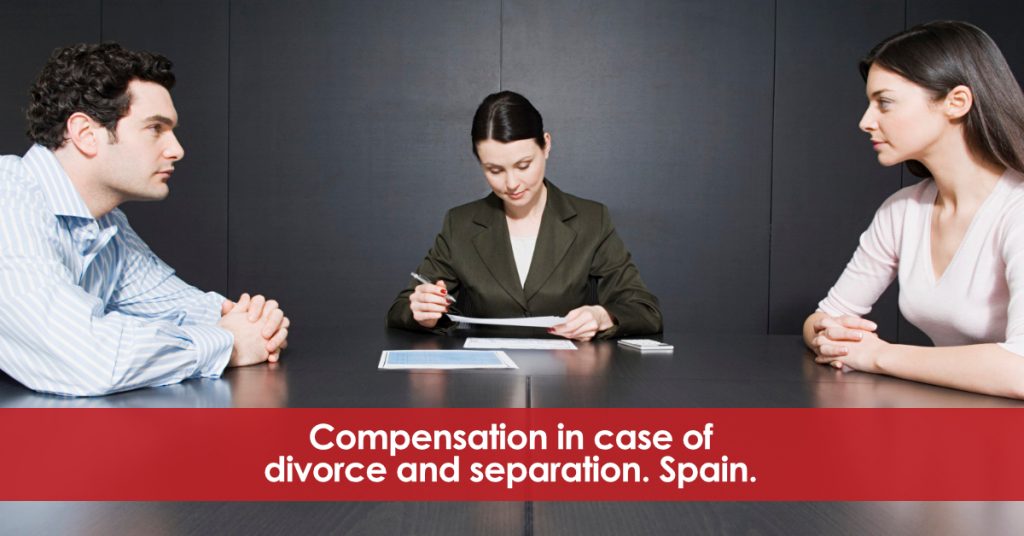A few weeks ago, we published an article where we analysed in detail the divorce maintenance of Art. 97 of the Spanish Civil Code. Today we turn our attention to another type of “compensation” foreseen in our legal system. It also applies to separation or divorces. We are referring to the compensation in case of divorce and separation of article 1438 of the Civil Code.
What does the compensatory allowance of Art. 1438 consist of?.
This compensatory allowance is established in article 1438 of the Spanish Civil Code, which states as follows:
“The spouses shall contribute to the support of the economic burdens of the marriage. In the absence of an agreement, they shall do so in proportion to their respective financial resources. Domestic work shall be counted as a contribution to the expenses and will entitle the spouses to obtain a compensation that the judge shall determine, in absence of an agreement, upon termination of the separation regime”.
Below we analyse the requirements that must be met to claim this compensation.
First requirement: it’s only possible under the separation of property regime.
Compensation in case of divorce and separation only exists when the matrimonial property regime of the spouses is separation of property. What does this regime consist of?. Under separation of property, the assets of each spouse are separated. That is to say: the assets or profits acquired by either of them, during the marriage, belong exclusively to them. There is no union or confusion of any kind between their assets or income.
Second requirement: Exclusive dedication to the family.
-. In order for a spouse to claim this compensation in case of divorce and separation, he/she must have contributed to the costs of the marriage solely and exclusively through the work done for the household. That is to say, by work on the domestic tasks of the house and the care of the children.
-. This dedication must be exclusive, but not excluding. In other words, the fact that the spouse who has stayed at home may receive outside help (a domestic helper, the “occasional” collaboration of the other spouse, etc.) in no way affects his/her right to claim this compensation.
-. Collaboration in the family business or professional activities of the other spouse, under “precarious” working conditions, in principle, should not prevent to claim this allowance either.
How is this compensation calculated?.
Article 1438 doesn’t establish any guiding criteria on how to calculate this compensation. However, the case law of the Supreme Court has set out a parameter to quantify this compensation. The equivalent to the salary that the spouse would have received for carrying out this work for a third person. It is very common to use the minimum interprofessional wage as a reference. For instance, the Supreme Court has awarded a compensation of €108,000, by multiplying the cost of a domestic worker per month (€600) by the number of years that a marriage lasted (15 years).
Is the pension under Art. 97 compatible with the compensation under art. 1438?.
Yes, both compensations are compatible and can be claimed for at the same time, as they serve different purposes. Alimony of art. 97 is intended to correct the economic imbalance between the spouses caused from the divorce. Compensation under art. 1438 is used to pay off the work done for the household.
When should I claim this compensation?.
Compensation in case of divorce and separation can be claimed in different moments. Either in the divorce or separation proceedings. Or at a later point in time, in a separate declaratory judgment procedure.
Conclusions.
In divorces or separations in which the matrimonial property regime is separation of property, the spouse who devoted himself/herself exclusively to the domestic work may be entitled to claim a compensatory. At White-Baos Lawyers we are experts in Family Law. If you have any doubts about this issue, or any other, please do not hesitate to contact us. We will study your case and offer expert advice on the subject.
The information provided in this article is not intended to be legal advice, but merely conveys information related to legal issues.
Carlos Baos (Lawyer)
White & Baos.
Tel: +34 966 426 185
E-mail: info@white-baos.com
White & Baos 2023 – All Rights Reserved.
